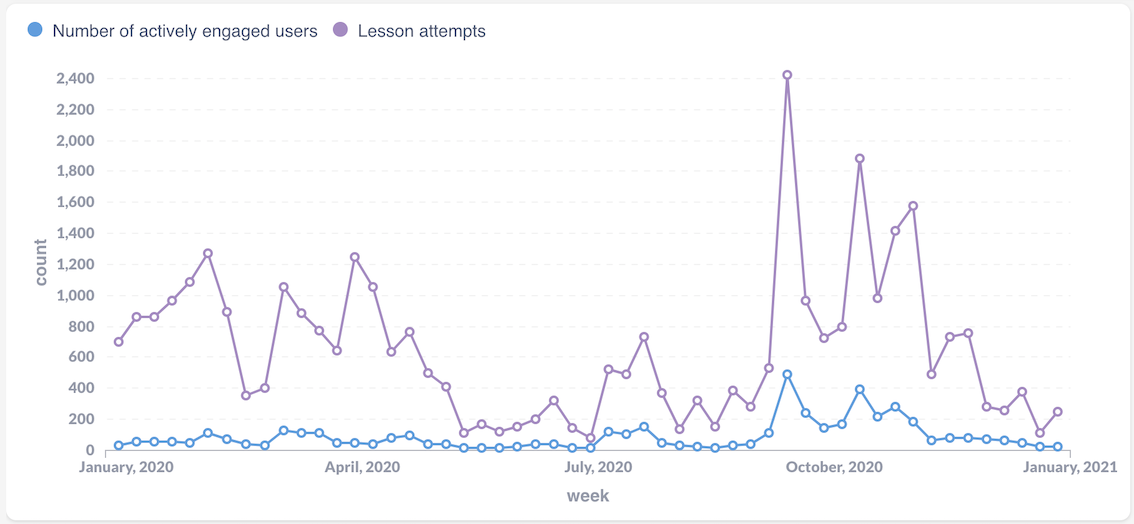Why Brands Should Incentivise Product Training for Sales Associates
Learn why brands should incentivize their content

Sales associates must engage with a brand’s training content to have knowledgeable conversations with customers and close potential sales. This is easier said than done, just uploading content to a sales enablement platform will only get brands so far.
Without a proper strategy and the right tools associates will only engage with brand training content so much. Therefore, in order to create as much engagement as possible brands need to find a way to stimulate interest and motivate sales associates to consume and interact with their content.
Brands need to remember that sales associates who work in multi-brand retail stores are inundated with content from multiple brands, by incentivizing associates to complete their content brands stand out from the crowd. Additionally, if sales associates are incentivized by another brand’s content they’re likely to become brand advocates of a competing brand, talking passionately about their products to customers.
Announcements
Announcements notify sales associates of your content and the more sales associates that know your content is live, the more of them that are likely to complete it. Similarly to how YouTubers ask subscribers to “subscribe and click the bell icon” so they know when a new video is uploaded, by announcing their new content brands can separate themselves from the plethora of brand training content associates are likely to see if they work in a multi-brand retailer.
Brands that use Myagi have seen, in some cases, lesson attempts increase by as much as 300% following an announcement of a lesson to sales staff.

By announcing lessons brands can separate themselves from the crowd of content that associates are faced with when they log onto a sales enablement platform. A higher number of associates completing a brand's content means more sales staff ready to answer questions from customers and potentially a higher sell-through rate, as knowledgeable staff close sales with consumers.
Creating Competition
Leaderboards allow sales associates to see their ranking among their colleagues. Seeing this ranking system can lead to sales associates engaging in more content as people’s natural competitive nature urges them to progress higher.
The gamification of education makes the experience of going through content more enjoyable for the sales associate; leads to increased engagement and improves knowledge retention.
Furthermore, a sales enablement platform that categorizes associates individually and in groups (for example by store or region) means that associates can work as a team to push their region to the top, creating a sense of shared accomplishment.
By using a leaderboard function, brands can un-knowingly incentivize sales associates to complete their content. As well as individual bragging rights, brands can motivate whole stores or regions to complete their content by pitting groups against each other. Finally, if brands reward individuals or teams with physical items for completing their content, they are likely to see engagement rates increase significantly.
Recognizing Associates
Badges reward sales associates for completing content and motivate them to continue to work through content set out by a brand as associates naturally strive to achieve as many badges as possible. Similarly to how video game creators reward gamers for achieving milestones with “achievements”, brands can reward sales staff with badges.
Furthermore, badges are a sign of recognition from a brand and help lead to brand advocacy. Sales associates that feel recognized by a brand are more likely to develop a strong connection to them and in turn, likely to recommend their products to consumers over the competition.
By rewarding sales staff with badges for completing content brands incentivize sales staff to continue working through their content. Similarly to leaderboards, accomplishing badges gives an associate bragging rights over their colleagues and this gamification of learning increases the likelihood of yielding positive results for both associates and the brand.
Conclusion
Brands that use a sales enablement tool to incentivize their content can expect to see higher levels of engagement - as a result of associates completing more of their content to rank higher on leaderboards; a higher level of sell-through due to associates having increased levels of knowledge retention and offering a better experience to customers and more brand advocacy - as associates form connections with their brand due to being rewarded for completing their content.
Myagi’s digital retail sales enablement platform features leaderboards, badges (with discount code and certificate implementation) and announcements so brands can push their content ahead of the pack’s to sales associates. Brands that incentivize content on Myagi have seen the active number of users increase by as much as 27%.
Furthermore, Myagi Services can help its customers incentivize their content and provide data-driven reports that help brands understand the effect incentivizing their content has had.




